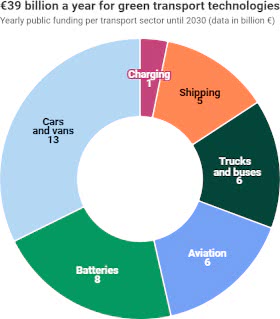
To decarbonise the European Union's transport sector
€39 billion in public investment needed
per year, money needed to maintain the competitiveness of the
and to ensure the development of green technologies in Europe
for transport. This is highlighted by a new study by Transport &
Environment (T&E), the non-governmental organization whose
objective is to reduce the environmental impact of
transport in Europe, specifying that if most of the
investments for the development of transport technologies
ecological resources, equal to 87% of the total, will come from investors
including industry and banking institutions, but the
capital-intensive industrial sectors and
energy infrastructure will need public support
estimated at 39 billion per year until 2030, a figure - he has
specified T&E - which is less than 42 billion euros
that European governments give to industry every year
that produces petrol and diesel cars.
"To make the sector greener, more
pollutant of Europe - said Xavier Sol, Director of Sustainable
T&E finance - there will be a need for investments
Significant. Not doing so will cost Europe not only the
net zero target, but also the competitiveness of its
major industries such as car manufacturing,
the production of batteries and the construction of ships and aircraft.
Public funds are needed - he explained - to create new
industries and bring the charging network and infrastructure up to speed
of the continent. Fortunately - added Sol - they are not always
More taxpayers' money needed: governments
can free up funds by reprioritising support
clean technologies and putting an end to the costly expansion of the
road network".
 Of the 39 billion euros per year deemed necessary to finance
the reduction of the environmental impact of the transport sector, the
The study specifies that 13 billion should be allocated to the
car and van segment, six billion to the
trucks and buses, six billion to the air transport sector and
five to that of maritime transport, eight billion to the segment
of battery production and one billion euros to the
charging systems.
Of the 39 billion euros per year deemed necessary to finance
the reduction of the environmental impact of the transport sector, the
The study specifies that 13 billion should be allocated to the
car and van segment, six billion to the
trucks and buses, six billion to the air transport sector and
five to that of maritime transport, eight billion to the segment
of battery production and one billion euros to the
charging systems.
Among the priorities highlighted by the study is
the establishment of a substantial fund to promote the production of
of electric batteries in Europe, which is subject to strong
pressure from China, investing a total of 25
billion euros by 2030. With regard to the production of
clean fuels for maritime and aviation transport,
study finds that this type of production is currently
and still in the early stages of development, with investors
who are therefore reluctant to take risks. Since 86 billion
of euros deemed necessary by 2030 to start production
of these fuels across Europe, T&E is calling on governments to
take charge of a third of these investments by providing guarantees and
loans to reduce the risks of private investment. In addition
in order to modernise Europe's energy infrastructure
ensuring that it can meet future vehicle demand
The organization calls on governments to double their
current investments in networks to reach 67 billion
euros per year until 2050, an effort that according to T&E could
be supported by halving the figure of 61 billion euros that the
European governments allocate to the construction of roads.